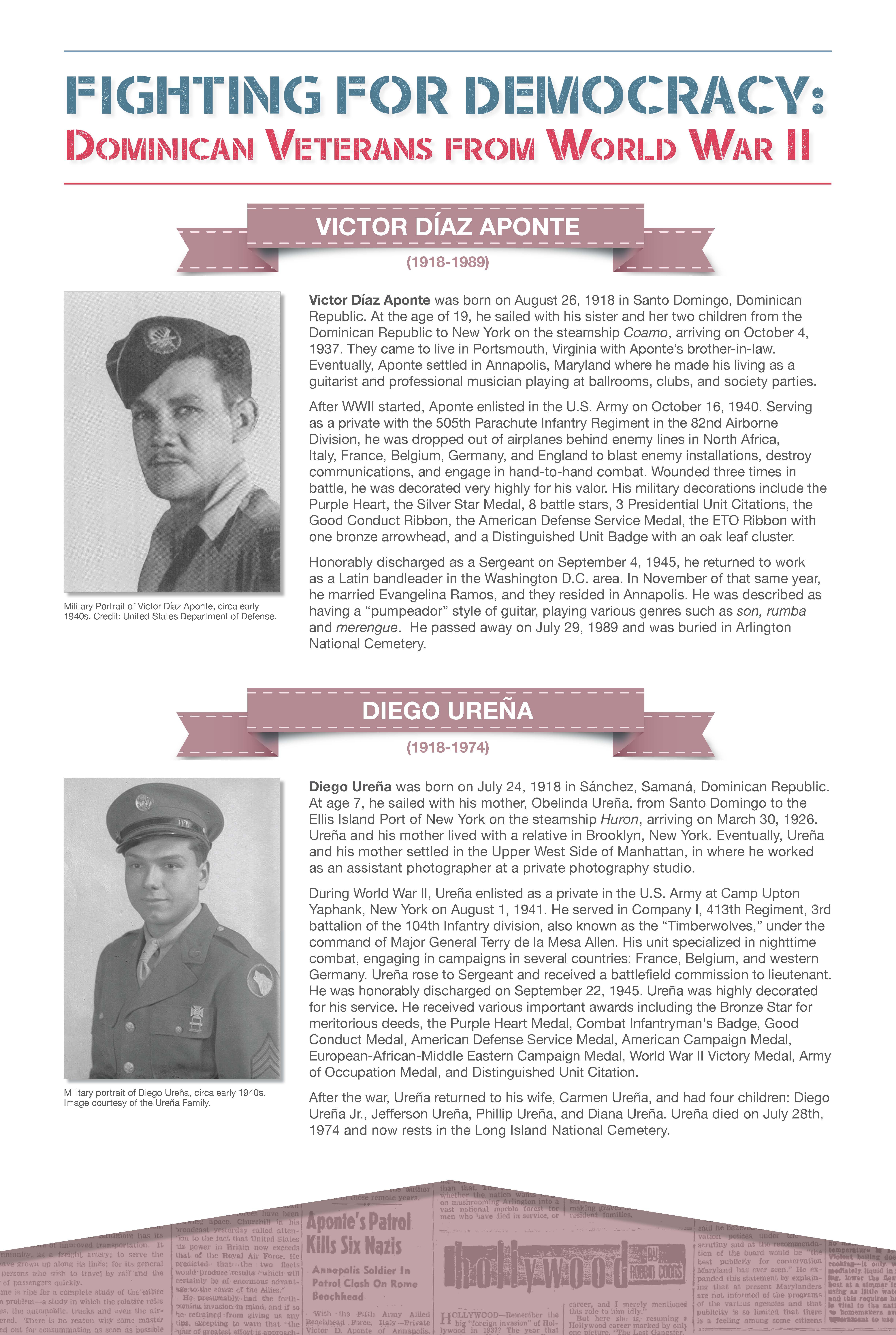Victor Diaz and Diego Ureña
Title
Subject
Creator
Source
Date
Contributor
Format
Language
Biographical Text
Victor Díaz Aponte was born on August 26, 1918 in Santo Domingo, Dominican Republic. At the age of 19, he sailed with his sister and her two children from the Dominican Republic to New York on the steamship *Coamo*, arriving October 4, 1937. They came to live in Portsmouth, Virginia with Aponte's brother-in-law. Eventually, Aponte settled in Annapolis, Maryland where he made his living as a guitarist and professional musician playing at ballrooms, clubs, and society parties.
After WWII started, Aponte enlisted in the U.S. Army on October 16, 1940. Serving as a private with 505th Parachute Infantry Regiment in the 82nd Airborne Division, he was dropped out of airplanes behind enemy lines in North Africa, Italy, France, Belgium, Germany, and England to blast enemy installations, destroy communication, and engage in hand-to-hand combat. Wounded three times in battle, he was decorated very high for his valor. His military decorations include the Purple Heart, the Silver Star Medal, 8 battle stars, 3 Presidential Unit Citations, the Good Conduct Ribbon, the American Defense Service Medal, the ETO Ribbon with on bronze arrowhead, and a Distinguished Unit Badge with an oak leaf cluster.
Honorably discharged as a Sergeant on September 4, 1945, he returned to work as a Latin bandleader in the Washington D.C. area. In November of that same year, he marries Evangelina Ramos, and they resided in Annapolis. He was described as having a "pumpeador" style of guitar, playing various genres such as son, *rumba* and *merengue*. He passed away on July 29, 198 and was buried in Arlington National Cemetery.
Diego Ureña was born on July 24, 1918 in Sánchez, Samana, Dominican Republic. At age 7, he sailed with his mother, Obelinda Ureña, from Santo Domingo to the Ellis Island Port of New York on the steamship *Huron*, arriving on March 30, 1926. Ureña and his mother lived with a relative in Brooklyn, New York. Eventually, Ureña and his mother settled in the upper West Side of Manhattan, in where he worked as an assistant photographer at a private photography studio.
During World War II, Ureña enlisted as a private in the U.S. Army at Camp Upton Yaphank, New York on August 1, 1941. He served in Company I, 413th Regiment, 3rd battalion of the 104th Infantry division, also known as the "Timberwolves," under the command of Major General Terry de la Mesa Allen. His unit specialized in nighttime combat, engaging in campaigns in several countries: France, Belgium, and western Germany. Ureña rose to Sergeant and received a battlefield commission to lieutenant. He was honorably discharged on September 22, 1945. Ureña was highly decorated for his service. He received various important awards including the Bronze Star for meritorious deeds, the Purple Heart Medal, Combat infantryman's Badge, Good Conduct Medal, American Defense Service medal, American Campaign Medal, European-African-Middle Eastern Campaign Medal, World War II Victory Medal, Army of Occupation Medal, Distinguished Unit Citation.
After the war, Ureña returned to his wife, Carmen Ureña, and had four children: Diego Ureña Jr., Jefferson Ureña, Phillip Ureña, and Diana Ureña. Ureña died on July 28th, 1974 and now rests in the Long Island National Cemetery.
Citation

